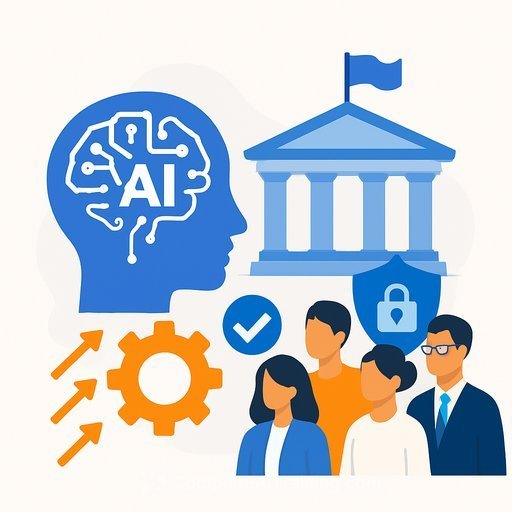The Complete Guide to Using AI as an HR Professional in Taiwan in 2025
Last updated: September 14, 2025
TL;DR
- Turn pilots into measurable wins. Track time-to-hire, retention, and time-to-competency.
- Follow the Draft AI Basic Act and MODA guidance. Keep human oversight and PDPA compliance front and center.
- Start with conversational assistants in Mandarin and Traditional Chinese, plus skills-based hiring and personalized onboarding.
- Use national programs: NT$50M pilot funding and the ~NT$200B AI plan. Partner on talent pipelines.
- Judge value by productivity, fairness, and employee experience-not novelty.
What is the new AI law in Taiwan?
Draft AI Basic Act and legal context
Taiwan's draft AI Basic Act takes a principle-first, risk-based path. It emphasizes sustainability, human autonomy, privacy, security, transparency, fairness, and accountability. MODA is tasked with building risk classifications and sector guidance via subordinate rules and sandboxes.
Civil society groups want clearer enforcement, stricter limits on high-risk use, and stronger alignment with the PDPA. For HR, expect tighter transparency, data minimization, and human oversight duties in policies and contracts. Track the legislative timeline and prepare procurement language now.
- 15 Jul 2024: NSTC publishes draft AI Basic Act for consultation
- 26 Feb 2025: Executive Yuan assigns MODA as the lead for promotion/interpretation
- 21 Aug 2025: Legislative committee negotiations completed; draft sent to plenary
- 28 Aug 2025: Executive Yuan passes draft and submits to Legislative Yuan for review
"Taiwan's AI industry must deploy ahead-if authorities focus only on control and red lines, Taiwan will lag in the AI wave." - Legislator Ko
What is the AI strategy in Taiwan?
Government programs, agencies and guidance
Policy treats AI as national infrastructure. The NDC's Five Trusted Industry Sectors ties AI to core industries. The "AI New Ten Major Construction" targets ~NT$200B for sovereign compute, platform software exports, and advanced R&D. MODA and NSTC are building evaluation and labeling to make adoption testable and auditable.
- AI New Ten Major Construction (NDC/NSTC): ~NT$200B proposal for AI capacity
- Five Trusted Industry Sectors (NDC): includes a NT$10B fund for AI/digital
- AI product and system evaluation (MODA/NSTC): testing and labels for trusted AI
"Without proper AI regulations, Taiwan risks chaotic applications; citizens could be running naked in the AI wave." - Ko Ru-chun
Practical HR use-cases in Taiwan: recruitment, performance, L&D and automation
Go where value is obvious. Use Mandarin/Traditional Chinese conversational assistants to automate screening and scheduling without hurting candidate experience. Free recruiters to focus on culture and judgment.
Adopt AI copilots for performance and L&D to generate insights and personalized learning paths. Tie programs to government-backed pipelines to close skills gaps faster. Build explainability and vendor checks into every tool.
- Recruitment: automated shortlisting and interview logistics
- L&D: personalized pathways and internal mobility mapping
- Performance: routine analytics with fairness and traceability checks
- Compliance: automated policy checks and audit trails
"The tech is ready. Businesses that ignore AI today will soon be at a disadvantage." - Alex Yeh
Risks, privacy and liability for HR in Taiwan: PDPA, IP and vendor risk
Treat PDPA as a hard boundary. Personal identifiers and sensitive data (e.g., health) require strict control. Serious violations can trigger high fines and even criminal penalties.
- Give clear notices at first collection; collect minimum necessary fields
- Use employer-employee contract terms and consent where applicable
- Map cross-border data transfers; apply special scrutiny for transfers to mainland China
- Build breach playbooks (some sectors expect ~72-hour reporting)
- Run vendor risk reviews: security, deletion proofs, and liability alignment
Personal Data Protection Act (official text)
Governance best practices for HR teams in Taiwan: policies, audits and oversight
Think paper trail. Publish an AI usage policy tied to PDPA rules, data minimization, consent, and retention. Require vendor test histories, explainability evidence, and traceability logs in procurement.
- Human-in-the-loop for key HR decisions; document overrides and rationale
- Immutable audit logs; treat them like a signed ledger
- Routine model validation, bias checks, and drift monitoring
- Pilot in sandboxes; use government evaluation services before scale
Ministry of Digital Affairs (MODA)
Contracts, procurement and vendor checklist for Taiwan HR buyers
- Lawful purpose and minimum data scope; PDPA-sensitive categories called out
- Process only as instructed; no secondary use without approval
- Security controls: encryption, access, logging, and region selection
- Right to audit; vendor provides test history and traceability logs
- Breach terms: notification content, ~72-hour timeline, remediation plan
- Sub-processor controls; approval for cross-border transfers
- Data subject request support; retention limits and verified deletion
- Indemnities for PDPA violations; realistic liability caps elsewhere
Agentic AI and the future of AI in HR in Taiwan: workforce design and roles
Agentic AI turns tasks into goal-driven workflows. Sourcing, screening, matching, preboarding-handled continuously by agents. HR doubles down on coaching, ethics, and culture.
- Decompose jobs into units of work; mark what to augment, automate, or keep human
- Stand up guardrails: approvals, audit cadence, explainability requirements
- Pilot, measure retention and fairness, then scale step by step
"Predictive shows what might happen, generative creates new content, agentic acts on our behalf. For HR, that shifts time from admin to human interactions." - Andre Allen, HRCI
How to become an AI expert in 2025: training, certifications and practical skills for Taiwan HR pros
Blend practical skills with policy fluency. Learn data minimization, explainability, human oversight, PDPA basics, model validation, vendor diligence, and simple data habits.
- Take focused courses on AI strategy and governance (Taipei options are common)
- Add an applied credential (e.g., an AI for HR certificate) to signal skill
- Run micro-projects: screening assistant, L&D copilot, compliance checker
- Measure time-to-hire, retention, and time-to-competency; document risks and outcomes
- Tap government programs: early funding ~NT$50M; first-phase goal ~152 professionals; target ~200,000 AI professionals in four years; stipends ~NT$20,000/month (study) and ~NT$30,000/month (internship)
If you want a head start, browse curated options here: Latest AI courses and Popular AI certifications.
Conclusion: Next steps and a one-page checklist for HR professionals in Taiwan
- Inventory AI use across hiring, monitoring, and L&D; map data flows and lawful bases
- Classify risk per MODA/NSTC guidance; pilot low-to-medium risk with human oversight
- Contract for traceability, testing history, deletion proof, and breach response
- Use evaluation services; validate explainability and safety before scale
- Measure business KPIs (time-to-hire, retention, time-to-competency)
- Measure technical KPIs (bias, drift, audit log completeness)
- Upskill HR to own oversight, validation, and vendor reviews
- Report to the board with clear evidence and rollback plans
Do not accept generic claims about responsible AI. Ask for evidence.
Frequently Asked Questions
What is Taiwan's draft AI Basic Act and what should HR prepare for now?
It is a risk-based framework built on core principles, with MODA leading interpretation and risk classification. Prepare for transparency, data minimization, and human oversight requirements. Update policies and contracts to support traceability and audits.
Which AI use-cases should Taiwan HR adopt first in 2025, and how should pilots run?
Start with conversational hiring assistants (Mandarin and Traditional Chinese), personalized onboarding, skills-based hiring, L&D copilots, and automated compliance checks. Run small pilots with human-in-the-loop, clear rollback plans, and dual metrics: business outcomes and technical quality.
What PDPA, privacy, liability, and vendor contract requirements matter most?
Collect only necessary data, provide clear notices, and define lawful bases. Control cross-border transfers, especially to mainland China. Contracts must include purpose limitation, audit rights, sub-processor controls, breach timelines, deletion proofs, encryption, and indemnities for PDPA violations.
How should HR govern AI deployments and measure impact?
Publish an AI policy, enforce traceability, and validate models regularly. Use immutable audit logs and evaluation services where available. Measure time-to-hire, retention, time-to-competency, bias, drift, and audit completeness.
How can HR professionals in Taiwan get AI-ready and what programs exist?
Pair short applied courses with an AI for HR certificate and hands-on micro-projects. Use government programs with funding, stipends, and targets to build talent pipelines. Validate tools through MODA/NSTC evaluation before scaling.
You may also be interested in
- Create fairer hiring practices with inclusive job descriptions that include 90-day objectives and ATS-friendly formatting.
- Invest in resilient HR skills like change leadership-careers grow where human strengths matter.
- Build strong employee relations case management for defensible documentation and local labor dispute readiness in Taiwan.
Your membership also unlocks:






